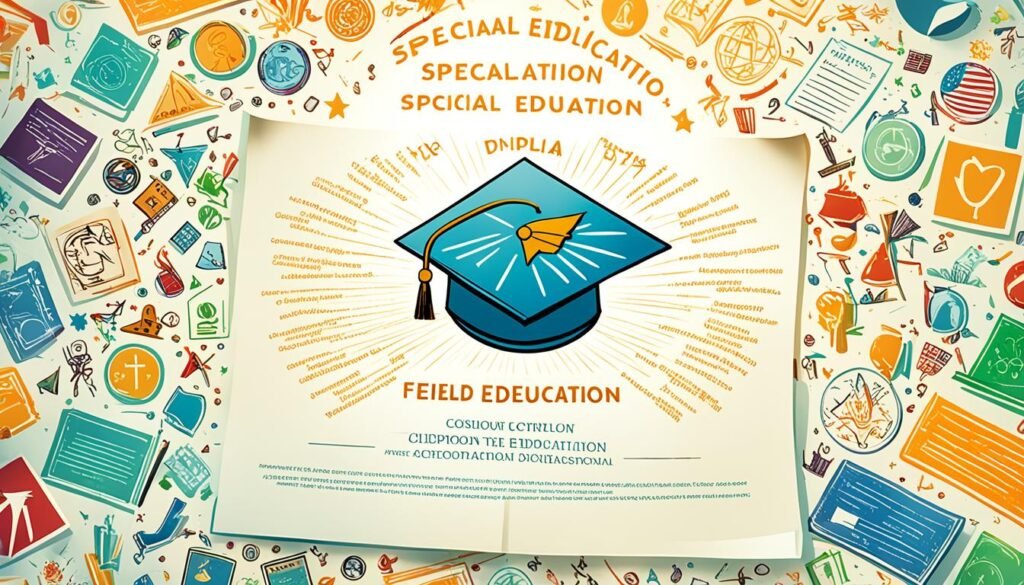A Master in Special Education Degree program is designed to equip educators with advanced knowledge and skills to effectively support students with diverse learning needs. These programs provide a comprehensive curriculum covering topics such as inclusive teaching strategies, assistive technologies, specialized teaching methods, and collaboration with families and professionals. Graduates of these programs are prepared to work as special education teachers, advocates, and leaders, making a meaningful impact on the lives of exceptional students.
The degree can be pursued through both online and on-campus formats, offering flexibility for working professionals. Graduates of Master in Special Education Degree programs are in high demand, as they possess the expertise to create inclusive, nurturing, and effective learning environments for students with a wide range of abilities and needs.
Also Read: Earn A Master In Special Educations Degree Online
Key Takeaways
- A Master in Special Education Degree program provides advanced training and specialization for educators to support students with diverse learning needs.
- These programs emphasize the development of inclusive teaching strategies, assistive technologies, and collaboration with families and professionals.
- Graduates are prepared to work as special education teachers, advocates, and leaders, making a meaningful impact on the lives of exceptional students.
- The degree is offered in both online and on-campus formats, providing flexibility for working professionals.
- Graduates of Master in Special Education Degree programs are in high demand due to their expertise in creating inclusive and effective learning environments.
Introduction to Special Education Degree Programs
Special education degree programs play a vital role in preparing educators to work with students who have a wide range of disabilities, learning difficulties, and exceptional needs. These programs are essential in addressing the growing demand for qualified special education teachers, as the number of students requiring specialized instruction continues to rise.
Also Read: Specialized Expertise: Master In Special Education
Understanding the Need for Special Educators
As the inclusive education movement continues to gain momentum, the need for skilled and knowledgeable special education teachers has become increasingly crucial. Students with diverse learning needs, such as those with physical, cognitive, or emotional disabilities, require specialized instruction and support to reach their full potential. Special education degree programs equip educators with the specialized skills and knowledge necessary to create inclusive, nurturing, and effective learning environments for these exceptional students.
Career Opportunities in Special Education
Graduates of special education degree programs have access to a wide range of career opportunities, including roles as special education teachers, instructional specialists, education advocates, and administrators. These professionals work in a variety of settings, such as public and private schools, specialized institutions, community-based organizations, and even higher education. By pursuing a special education degree, individuals can make a meaningful impact on the lives of students with diverse learning needs, empowering them to thrive and reach their full potential.
Master In Special Education Degree

A Master in Special Education Degree program provides advanced training and specialization for educators who wish to deepen their expertise in supporting students with diverse learning needs. These programs typically require 30-36 credit hours of graduate-level coursework and may be completed through both on-campus and online formats.
Program Overview
The curriculum of a Master in Special Education Degree program is designed to equip educators with the knowledge, skills, and strategies necessary to create inclusive, supportive, and effective learning environments for students with a wide range of abilities and exceptional needs. Coursework covers topics such as inclusive teaching methodologies, assistive technologies, specialized instructional techniques, and collaboration with families and other professionals.
Also Read: West Coast University North Hollywood – Your Pathway
Curriculum and Coursework
The curriculum of a Master in Special Education Degree program typically includes a blend of core courses and electives, allowing students to tailor their learning experience to their specific interests and career goals. Core courses often focus on areas such as educational psychology, disability studies, behavior management, and instructional design. Electives may cover specializations in early childhood special education, autism spectrum disorder, or behavior disorders, among other topics.
| Core Courses | Elective Courses |
|---|---|
|
|
Through a combination of theoretical knowledge and hands-on learning experiences, graduates of a Master in Special Education Degree program are equipped to make a significant impact on the lives of students with diverse learning needs.
Enhancing Skills for Diverse Learning Needs

A key focus of Master in Special Education Degree programs is equipping educators with the skills to create inclusive and effective learning environments for students with diverse needs.
Also Read: Advance Your Career With Medical Coding Course Online
Inclusive Teaching Strategies
that promote active engagement, differentiated instruction, and universal design for learning (UDL) principles.
By mastering inclusive teaching strategies, special education teachers learn to tailor their instructional methods to accommodate a wide range of learning styles and abilities. This may include utilizing multi-sensory techniques, implementing assistive technologies, and fostering collaborative learning opportunities that allow all students to participate and succeed.
Assistive Technologies in the Classroom
In addition to inclusive teaching strategies, Master in Special Education Degree programs also highlight the importance of integrating assistive technologies into the classroom. Graduates of these programs gain expertise in leveraging a variety of assistive tools, such as text-to-speech software, digital graphic organizers, and specialized communication devices, to support the unique needs of students with disabilities.
By incorporating assistive technologies, special education teachers can empower their students to actively engage with the curriculum, communicate more effectively, and develop essential academic and life skills. This comprehensive approach to teaching and learning ensures that every student, regardless of their individual needs, has the opportunity to thrive in the classroom.
Specializations in Special Education

Many Master in Special Education Degree programs offer students the opportunity to specialize in specific areas of the field, enabling them to develop advanced expertise in addressing the unique needs of particular student populations. These specialized tracks allow educators to tailor their studies and acquire specialized skills that can make a significant impact on the lives of exceptional learners.
Also Read: What Makes Touro University A Top Choice For Healthcare Education?
Early Childhood Special Education
For those passionate about supporting the development of young children with special needs, the Early Childhood Special Education specialization provides in-depth training in areas such as early intervention strategies, inclusive learning environments, and collaboration with families and multidisciplinary teams. Graduates of this track are equipped to work with infants, toddlers, and preschoolers with a wide range of disabilities, ensuring they receive the foundational support necessary for future academic and social success.
Autism Spectrum Disorder
The Autism Spectrum Disorder specialization equips educators with the specialized knowledge and skills to effectively support students on the autism spectrum. This track delves into evidence-based instructional methods, behavior management techniques, and the unique communication and sensory needs of individuals with autism. Graduates of this program are prepared to create tailored, inclusive learning environments that enable students with autism to thrive academically and socially.
Behavior Disorders
For educators who are passionate about supporting students with emotional and behavioral challenges, the Behavior Disorders specialization offers advanced training in areas such as applied behavior analysis, positive behavior interventions and supports, and trauma-informed practices. Graduates of this track are equipped to design and implement comprehensive behavior management plans, fostering safe and nurturing learning environments for students with complex behavioral needs.
Online vs. On-Campus Programs

When it comes to pursuing a Master in Special Education Degree, prospective students have the flexibility to choose between online and on-campus program formats. Both options provide comprehensive curricula and hands-on learning experiences, catering to the diverse needs and preferences of aspiring special education professionals.
| Online Programs | On-Campus Programs |
|---|---|
|
|
Ultimately, the choice between online and on-campus Master in Special Education Degree programs will depend on each student’s individual learning style, schedule, and career goals. Both formats offer high-quality education and prepare graduates for rewarding careers in the field of special education.
Fieldwork and Practicum Experiences

Fieldwork and practicum experiences are essential components of Master in Special Education Degree programs, allowing students to apply their knowledge and hone their skills in real-world educational settings. These hands-on learning opportunities provide aspiring special education teachers with invaluable experience in working directly with students, implementing evidence-based instructional strategies, and collaborating with families and professionals.
Gaining Hands-On Experience
Throughout their degree program, students typically participate in a series of supervised fieldwork experiences, where they observe and assist experienced special education teachers in various classroom settings. These placements may include elementary, middle, or high schools, as well as specialized schools or programs for students with particular needs, such as autism spectrum disorder or emotional/behavioral disorders.
In addition to classroom observations, students often have the opportunity to take on teaching responsibilities, leading lessons, implementing individualized education plans (IEPs), and managing the unique challenges of diverse learning environments. This hands-on experience allows them to develop a deeper understanding of the day-to-day responsibilities of special education professionals and the strategies required to effectively support students with diverse needs.
Developing Classroom Management Skills
Alongside their fieldwork, Master in Special Education Degree students engage in practicum experiences that focus on honing their classroom management skills. These supervised teaching placements provide students with the opportunity to plan and deliver lessons, manage student behavior, and implement behavior intervention plans tailored to the specific needs of their students.
Through these practicum experiences, aspiring special education teachers learn to create inclusive, positive, and structured learning environments that foster student engagement, academic progress, and social-emotional well-being. Feedback and guidance from experienced mentor teachers and university supervisors help students refine their classroom management techniques and develop the confidence and expertise necessary to thrive in their future roles.
Licensure and Certification Requirements

Earning a Master in Special Education Degree is an essential step towards obtaining the necessary licensure and certifications to work as a special education teacher. However, the specific requirements can vary significantly depending on the state in which one wishes to teach.
State-Specific Guidelines
Each state has its own set of guidelines and regulations governing the licensure and certification of special education teachers. Prospective students must carefully research the specific requirements in their state of choice, as these can include completing a state-approved teacher preparation program, passing relevant exams, and fulfilling a minimum number of supervised classroom hours.
Continuing Professional Development
Even after obtaining their initial teaching license or certification, special education professionals are often required to engage in ongoing professional development to maintain their credentials. This may involve completing continuing education courses, attending workshops, or participating in specialized training programs to stay up-to-date with the latest research, teaching methods, and best practices in the field of special education.
Preparing for a Rewarding Career

A Master in Special Education Degree program equips graduates with the expertise and leadership skills necessary to embark on rewarding careers that make a profound impact on the lives of students with diverse learning needs. Collaboration with families and professionals is a crucial aspect of this field, as special education teachers work closely with parents, therapists, counselors, and other stakeholders to develop comprehensive, personalized learning plans that address each student’s unique challenges and help them reach their full potential.
Collaboration with Families and Professionals
Effective communication and partnership-building are essential skills that are honed during a Master in Special Education program. Graduates learn to navigate the complex web of services and support systems available to students with special needs, fostering strong relationships with families and collaborating with a wide range of professionals to ensure a coordinated, holistic approach to education and support.
Advocating for Students with Special Needs
In addition to their instructional responsibilities, special education teachers serve as passionate advocates for their students, ensuring they receive the accommodations, resources, and opportunities they need to thrive. Master’s-level education prepares graduates to navigate the legal and administrative processes surrounding individualized education plans (IEPs), collaborate with school administrators, and champion the rights and needs of exceptional learners within the educational system.
Choosing the Right Special Education Program

When selecting a Master in Special Education Degree program, prospective students should consider several important factors to ensure they choose the right fit for their educational and professional goals.
Accreditation and Program Rankings
It is crucial to research the accreditation and rankings of the special education degree programs you are considering. Look for programs accredited by reputable organizations, such as the Council for the Accreditation of Educator Preparation (CAEP) or the National Council for Accreditation of Teacher Education (NCATE). Additionally, consult rankings from respected sources like U.S. News & World Report to understand the program’s reputation and quality.
Financial Aid and Scholarships
Financing your education is an important factor to consider when choosing a special education program. Investigate the availability of financial aid, scholarships, and assistantships offered by the institution. Many universities and colleges have dedicated funding opportunities for students pursuing advanced degrees in special education, which can help offset the cost of tuition and living expenses.
| University | Accreditation | Ranking | Scholarships Available |
|---|---|---|---|
| University of Kansas | CAEP | Top 10 in the nation | Yes, including the KU Special Education Scholarship |
| Vanderbilt University | CAEP | Top 20 in the nation | Yes, including the Peabody College Scholarships |
| University of Washington | CAEP | Top 15 in the nation | Yes, including the College of Education Scholarships |
Unlocking New Horizons with a Special Education Degree

A Master in Special Education Degree opens the door to a rewarding and impactful career, empowering educators to make a profound difference in the lives of students with diverse learning needs. This advanced degree equips graduates with the specialized knowledge, practical skills, and leadership abilities necessary to create inclusive, supportive, and enriching educational experiences for exceptional students.
By earning a Master in Special Education Degree, educators gain the expertise to design and implement personalized instructional strategies that cater to the unique needs of each student. They develop a deep understanding of various exceptionalities, from learning disabilities and autism spectrum disorders to emotional and behavioral challenges. This specialized knowledge allows them to foster a learning environment that promotes academic growth, social-emotional development, and the overall well-being of their students.
Beyond the classroom, graduates of a Master in Special Education Degree program are equipped to serve as advocates, collaborators, and leaders in the field of special education. They are skilled in navigating the complex educational system, collaborating effectively with families, and working alongside multidisciplinary teams to ensure that the diverse needs of their students are met. This level of expertise positions them as valuable assets in their schools and communities, driving positive change and making a lasting impact on the lives of exceptional learners.
By unlocking the doors to a Master in Special Education Degree, educators embark on a transformative journey that empowers them to make a profound and lasting difference in the lives of students with diverse learning needs. This advanced degree equips them with the specialized knowledge, practical skills, and leadership abilities necessary to create inclusive, supportive, and enriching educational experiences that unlock new horizons for exceptional students.
Earning a Master of Arts in Special Education through an online degree program is designed to equip graduates with the expertise needed to become a special education teacher. Throughout the program, students delve into education courses tailored to inclusive classrooms, learning how to work effectively with students of diverse learning needs. By earning their degree, graduates gain essential knowledge in special education laws, individualized education programs, and assistive technologies. The curriculum emphasizes multiple methods of assessment and prepares students for licensure and certification required by state departments of education. Whether transitioning from a bachelor’s degree or advancing in their career, this online Master’s in Special Education empowers educators to make a meaningful impact in the field of special education.
Also Read: What Does An Education Specialist Do?
Conclusion
The Master in Special Education Degree is a transformative educational pathway that empowers educators to make a profound and lasting impact on the lives of students with diverse learning needs. This advanced degree program provides a comprehensive, specialized curriculum that equips graduates with the knowledge, skills, and leadership abilities necessary to create inclusive, supportive, and enriching educational experiences.
Graduates of the Master in Special Education Degree program are poised to become highly sought-after educators, capable of addressing the unique needs of students with disabilities, learning challenges, and exceptional abilities. By mastering inclusive teaching strategies, assistive technologies, and evidence-based instructional methods, these educators are uniquely positioned to foster learning environments that celebrate diversity and empower all students to reach their full potential.
As the demand for qualified special education professionals continues to grow, the Master in Special Education Degree stands as a vital credential that opens the door to a deeply rewarding and impactful career. Through this advanced program, educators can cultivate the expertise, confidence, and leadership skills required to transform the lives of exceptional students and make a meaningful difference in their communities.
FAQs
Q: What is a Master in Special Education degree?
A: A Master in Special Education degree is a graduate-level program designed for educators who want to focus on teaching students with disabilities or exceptionalities.
Q: How can a Master in Special Education degree benefit me?
A: Earning a Master in Special Education degree can help you become a special education teacher, qualify for teaching students with disabilities, and obtain a teaching license in special education.
Q: Can I pursue a Master in Special Education degree online?
A: Yes, there are many online degree programs available for individuals interested in obtaining a Master in Special Education degree.
Q: What are some of the topics covered in special education courses?
A: Special education courses typically cover areas such as inclusive classrooms, teaching students with disabilities, individualized education programs, and special education laws.
Q: What are some career opportunities for special education graduates?
A: Special education graduates can pursue careers as special education teachers, general education teachers working with exceptional children, or professionals in the Department of Education.
Q: Is there a difference between a Master of Arts and a Master of Education in Special Education?
A: While both degrees focus on special education, a Master of Arts may emphasize language arts or English language learners, while a Master of Education may focus more on professional growth and experiential learning.
Q: Are there online options for becoming a special education teacher?
A: Yes, online special education degree programs exist for teachers seeking to earn their degree or teaching certification in special education.





